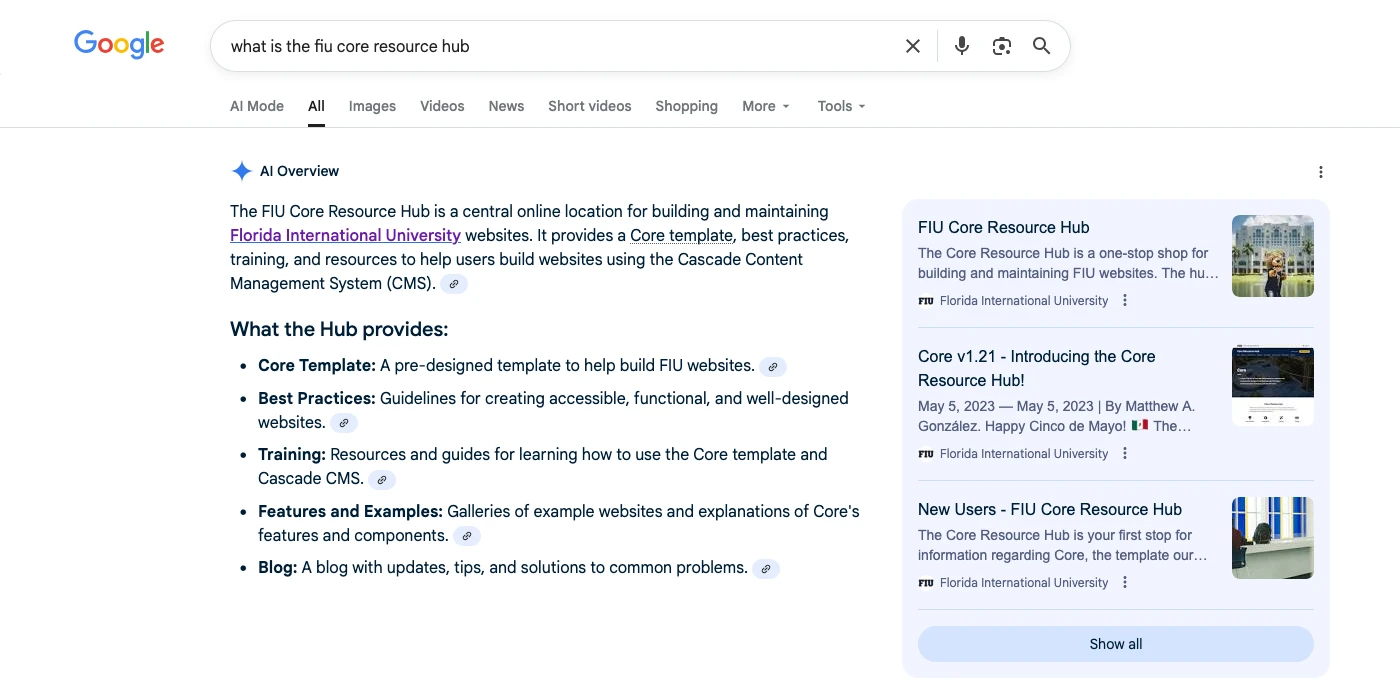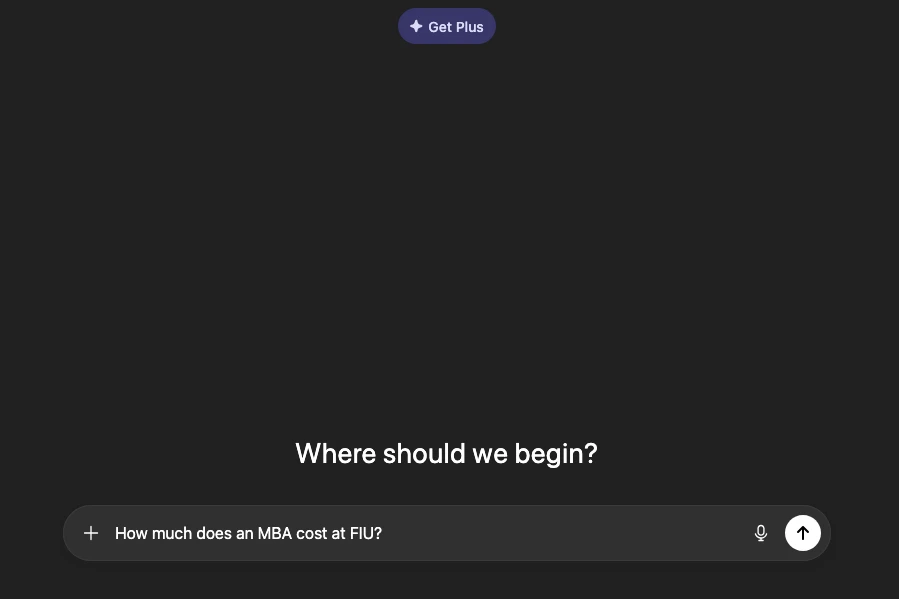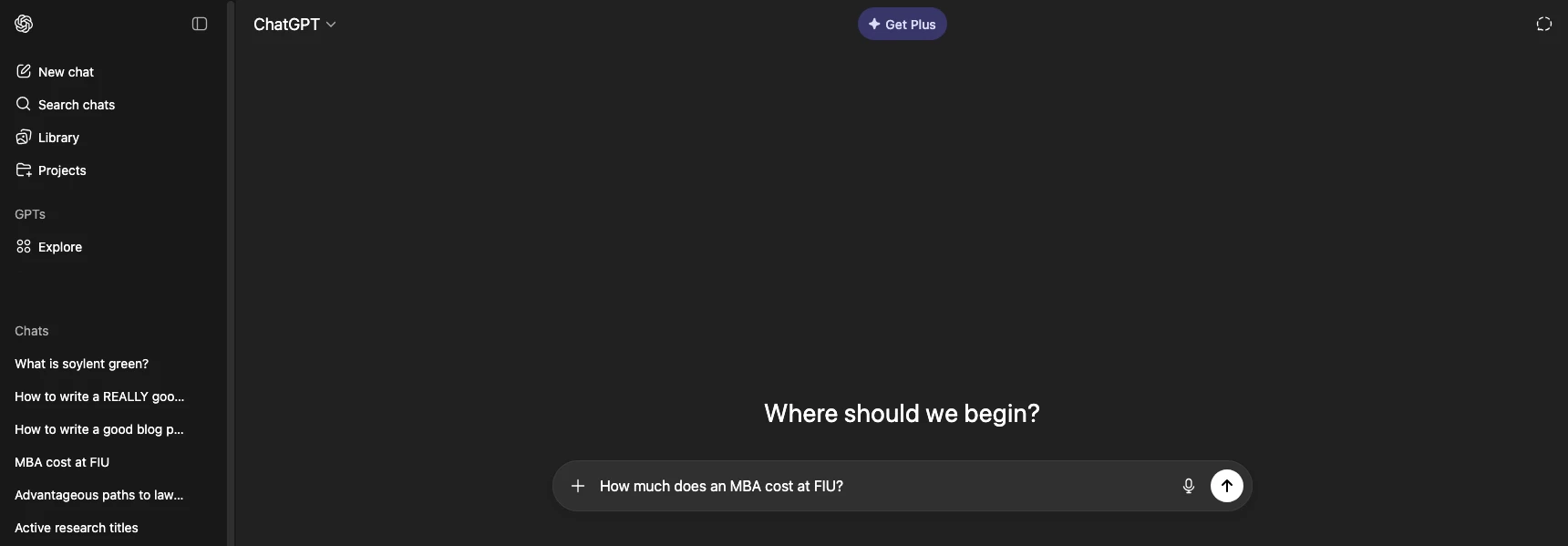Optimizing our websites for search engines has always been a priority, but increased adoption of AI demands a new approach focused on readability and recognition by large language models like ChatGPT and Gemini.
AI is changing the way we search
The Digital Education Council's 2024 Global AI Student Survey showed that about 70% of students reported using AI tools to search for information. And, based on user trends, that number only seems to be going up.
Users aren't just using a different tool to search, either! They're also behaving differently in the way they search. The most noticeable difference is the emergence of zero-click: a reliance on AI summaries or prompt responses, instead of clicking pages on traditional search results.
AI is a big deal and it's here to stay, so our job as content managers is to accommodate new behaviors with new content strategy techniques.
With that in mind, what should we be accounting for in this age of AI?
Generative Search and AI Overviews
Users have embraced AI tools over traditional searches, showing a greater reliance on generative search engines like ChatGPT and AI summaries like Google's AI Overview. Rather than inputting keyword-focused queries, users are typing out their searches in question format the way they would type it in ChatGPT, like "What is the FIU Core Resource Hub?" instead of "fiu core template hub resources."

Once they hit Enter, they are reading AI summaries compiled from content on our websites. This leads to three critical differences from traditional searches:
- Less emphasis on ranking, as AI summaries often pull content from many sources
- More emphasis on longer strings of text (like full questions) versus keywords
- Reliance on quick, bite-sized content that fits the AI summary formatting, like bulleted lists
As you can see from our Google search above, the AI Overview is not perfect—we've written plenty of blog posts since 2023 that it could have recommended! But, it also accurately summarizes information from a handful of pages on our website.
That accuracy stems from our team's use of best practices that fit generative engine optimization (GEO), the optimizing of content for generative search engines and AI summaries.
SEO vs. GEO
Now, I know what you're thinking. You have been managing content for a while now and search engine optimization (SEO) has always been a central part of your strategy. Shouldn't better SEO equal better GEO? Aren't they effectively the same thing?
The answer: yes and no. SEO focuses on search engine ranking, while GEO improves how your content is actually displayed in generative searches. That being said, higher-ranked content is more likely to appear in generative searches, so it never hurts to improve your SEO.
A good way to look at it is that SEO and GEO complement each other while also having unique characteristics. Some experts go so far as to suggest that GEO is a direct evolution of SEO, not a replacement.
How do I optimize my content for AI?
Most SEO practices improve GEO, so making your content "AI-ready" is more about taking an extra step in your content strategy process rather than scrapping your process altogether. Readability, mindful word choice and concise writing are combined with style and formatting changes that accommodate generative search behaviors.
Headings
One of the easiest and most effective ways you can improve your website's GEO is through effective headings. If you've been following our tips for maximizing your organic content, then you already know the power of a good heading. What you might not know, however, is what makes up an AI-friendly heading.
Your users are asking AI and search engines their questions. You want to answer those questions. Therefore, use your headings to "mark" questions and answers for AI. Headings are very visible parts of your website and it's no different for AI.
Did you notice the H2 of this section is "How do I optimize my content for AI?" I bet AI noticed!
Frequently Asked Questions
If questions are the new framework for writing content, then what better way to list questions and answers than a Frequently Asked Questions (FAQs) page? Packaging common questions together with their responses makes it easier to curate what information AI tools are pulling from your website.
Note that FAQs are not replacements for good content strategy. In other words, don't use them as a dumping ground for all the information on your website. Instead, think of them as hubs where you can compile information that already exists elsewhere on your website and make it easily accessible for users and AI.
Lists
Per Semrush's AI Overviews study, almost 90% of queries that trigger an AI Overview are searches for information, plain and simple. Users want to know how much things cost, when they start and what requirements need to be fulfilled.
When it comes to these queries, AI tools love lists, and it's easy to see why. If you're applying for a program, do you want crucial requirements spread out in multiple paragraphs of text, or would you rather have the requirements summarized in a neat list?
If it's easier for you to read, then it's easier for AI tools to summarize. The next time you need to list something out, don't hesitate to click that bullet button! Better still, combine lists with other best practices for maximum effect:
What's a good way to improve my site's GEO?
- Lists
- More lists
- Good headings for the lists
What's next for AI search?
AI search tools are still new, which means they're always evolving. The ways we respond to them should be evolving as well. Even now, new tools and new standards are on the horizon.
Google AI Mode
Google's new AI Mode is an advanced search that uses an interface similar to ChatGPT's prompt-and-response model, but applies it strictly to informational searches. It expands upon AI Overview, providing a more in-depth summary of search queries and direction for further research. Like the AI Overview, it isn't perfect, but it is powerful and popular.
One interesting aspect of AI Mode is that it is somewhat transparent about how many different websites it's pulling information from. In the case of our search directly asking Google AI Mode what it is, there are 66 websites serving as sources for the information provided. That's a lot of websites and definitely something to keep in mind next time you consider SEO vs. GEO!
llms.txt
Another ongoing development is llms.txt, a special text file that maximizes the accessibility of your information for generative search engines. The file boils information down to the plainest possible format, eliminating any extra HTML coding.
Adoption of the llms.txt is a grassroots effort and not a universal standard just yet, but more website managers are adopting it as AI takes a greater role in the digital landscape. If you want to learn more, we recommend Hostinger's guide on what an llms.txt file is and how to write one.
Keep an eye out for future posts
With more users asking our team about AI and how it works, we are making AI-focused blog posts a top priority. Be on the lookout for further reading and don't hesitate to reach out to the Digital Communications team at digimaint@fiu.edu if you need any assistance with making AI a part of your content strategy!

